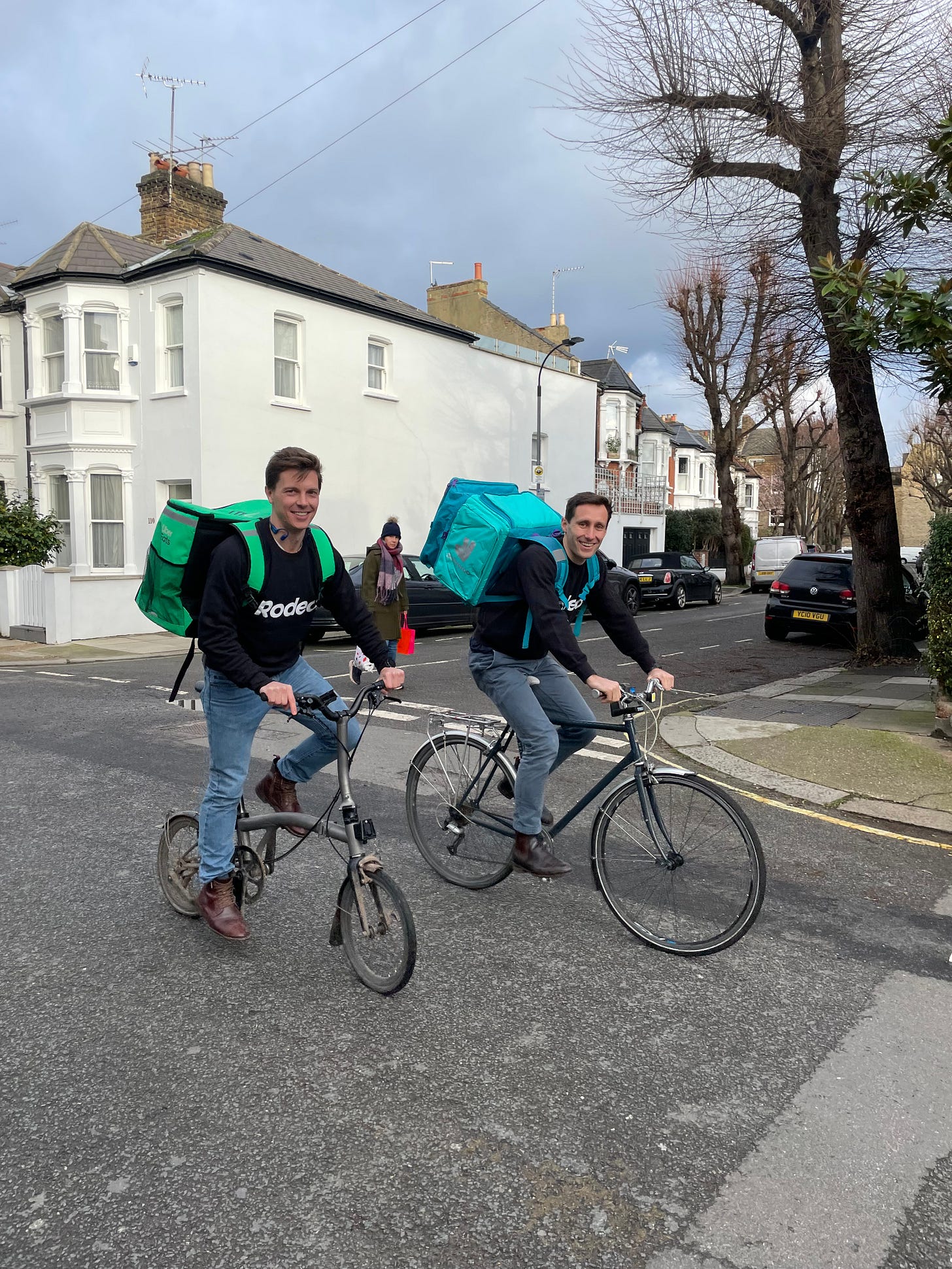Rodeo Is Reinventing UK Gig Work
Call for Curbivore 2024 speakers, boosting ebike deliveries, fresh rail funding
Calling all speakers – are you working at the forefront of mobility, transportation, curb management, restaurant / retail tech, delivery or civic policy? Apply to speak at Curbivore 2024.
For today’s edition, we’re checking in with Alfie Pearce-Higgins, Co-Founder of London-based Rodeo. Rodeo is a platform connecting gig workers with the delivery and mobility networks that rely on them. Given how different labor regulations, transportation patterns and fleet choices look in the U.K., this conversation illuminates a broad range of issues.
Jonah Bliss: Let’s start with something simple, what’s Rodeo?
Alfie Pearce-Higgins: Rodeo is a fairer and more efficient model for the gig economy. We are building a transparent, competitive market for the services of gig workers.
For drivers, it is a single account where you can upload all your documents, demonstrate your experience and skills and access new work opportunities with a single click.
For businesses it combines the reliability of inhouse delivery with the flexibility of outsourced delivery.
JB: What was your background before founding the company, and what inspired you to start Rodeo?
APH: We had all worked in different parts of the gig economy and seen both the good and the bad bits. I was CFO of Safeboda, a driver focussed ride-hailing company in Africa. Both Will and Ali spent 5 years at Deliveroo. We then all worked together in the heady days of 2021 grocery delivery start-ups. On top of this we’ve done deliveries for pretty much every company out there.
We’ve seen that lots of people like the flexibility of gig work. But we also believe that there needs to be a more transparent and efficient model to help people find and choose the right work for them.
JB: Give us a lay of the land, what’s the gig work sector like in the U.K.?
APH: The gig economy in the UK can best be described as being in flux.
In our vertical there are roughly 250,000 food delivery drivers, most of whom work for multiple platforms and companies, the three biggest of which are Uber Eats, Deliveroo and Just Eat.
Everyone knows that regulation is coming but no-one is quite sure what it will look like. At the moment driver's independence is heavily premised on the right to ‘substitute’ - effectively unchecked account sharing. This leads to exploitation of vulnerable workers, jeopardizes customer safety and encourages illegal immigration.
We believe that instead, independence should be based on workers being able to make informed decisions and sell their services into a transparent competitive market.
JB: What draws workers to the Rodeo ecosystem?
APH: Anyone who has worked on or at a food delivery platform knows that drivers usually come a distant third in the pecking orders, with customers and restaurants being the priorities. Rodeo is built by people who have done deliveries and believe that drivers’ needs should be prioritized. We don’t always get everything right (well, not the first time) but we listen to our users and try to design and build products around drivers.
In the last year we have built tools to help drivers:
Track their income and monitor their performance
Optimize earnings by seeing where and when the best jobs are
Chat with other drivers and share and compare experience
We’re now focussed on helping drivers use their Rodeo Profile to find and apply for new work opportunities.
JB: What draws the gig companies to Rodeo? Which are some of the companies you work with?
APH: We are currently working with businesses across the restaurant and grocery industry. Many face uncomfortable trade-offs when it comes to delivery: outsourcing to a 3PL is flexible but means giving up control of customer experience and sacrificing reliability; doing it all in-house can be a hassle and reduces the ability to react to variable levels of demand.
Rodeo Works provides the best of both worlds. Companies can build and manage a flexible pool of drivers they trust while we manage the onboarding, contracting and payments. And whenever they need more they can tap into a pool of more than 14,000 verified, experienced drivers.
JB: How do you go about winning over the big gig platforms, what’s your relationship with them like?
APH: Mixed. Most recognise that drivers have the right to access and control their data and can see the direction of travel for the industry. But, as in any sector, there will always be those who try to use their size (and lawyers) to bully others. It’s sad to see how quickly a former startup can become a regressive incumbent.
JB: Would you like to see some changes to British policy, in terms of how gig work is managed, or how the platforms work with aggregators like yours?
APH: Regulators and policy makers all over the world are battling with how to balance tech enabled flexible labor markets with workers’ rights - it’s a tough job.
We strongly believe that workers should have the freedom to choose flexibility and independence. But this independence needs to be safeguarded - data access and portability are vital in underpinning transparent, competitive markets into which workers can sell their services.
Just as Open Banking has empowered financial consumers we are strongly encouraging regulators to make Smart Earnings Data a pillar of their plans for a fairer, more sustainable gig economy.
JB: Any final thoughts, or things we could take back to implement in America?
APH: In most ways America is well ahead of Europe in the gig economy and delivery sector. There is more competition, more innovation and more experimentation with regulatory approaches (at a state level at least).
There are some areas where the UK and Europe might have an edge though.
GDPR, although far from perfect, sets some good precedents when it comes to data rights.
And from a personal perspective I’m a big fan of the prevalence of moped/e-bike delivery here: four-wheels good, two-wheels better.
HOT INDUSTRY NEWS & GOSSIP
There’s no such thing as a bus lane without proper enforcement: So it’s exciting to see LA Metro sign a contract with Hayden AI, to equip busses with cameras to detect vehicles that have wrongfully encroached into dedicated bus stops and lanes. Due to jurisdictional issues, LA City will issue the actual ticket; operations begin next Spring.
Et tu? After searching for a buyer for months, TuSimple is shuttering its autonomous trucking operations in America, retrenching to Asia. Competitor Aurora is having a better time, with plans to expand to 20 trucks making real hauls across 2024.
Trains, trains, trains: Papa Biden unveiled a slew of funding for new train projects across the country, including about $3 billion a piece for high speed rail in California and CA-to-NV, $1B in North Carolina, and billions more for the rest of the country.
Why? Detroit is unveiling a quarter mile of road that will charge specially-equipped EVs while they drive. Maybe just drive in circles for two hours to “solve” something you could do with 15 minutes at a Level 3 charger?
Always Amsterdam: The Danish capital is making its human-friendly streets even friendlier. The city is lowering the speed limit on most major roads to 30 kilometers (~19 miles) per hour, down from the current 50kph.
New York, New York: Mayor Adams is promising to remove 1,000 parking spots near intersections, as daylighting the crossings will improve ped safety. Meanwhile, congestion pricing is one step closer to being officially official. And the NYT wonders if the implementation of those congestion charges will impact the city’s famously friendly car culture. (“Im drivin’ heah!”)
Let us have nice things! LA’s City Council is considering changes to its Al Fresco ordinance that would remove the ability for many setups to go totally parking-free. (But my understanding is that AB 2097 means any restaurant near a transit stop could still be carless.) Meanwhile the Coastal Commission also continues to make removing car parking a hassle; gotta love 1970’s style “environmentalism.”
Here come more batteries… The Department of Energy has confirmed that inland California’s Salton Sea is rich in lithium resources. This will be a geopolitical and human rights related boon for making EV batteries, and also could bring good jobs to a very poor corner of the state.
News from our neighbors: Toronto just gave the OK to a long-awaited subway extension to Richmond Hill, expanding Line 1 by eight kilometers. And in Guadalajara, Mexico, line 4 is now over 1/3 complete; the LRT is projected to cost about $36.5 million per mile — not too shabby!
Boosting ebikes: SF scored a fresh $600k in grant funding to provide free ebikes to delivery workers, while NYC is piloting li-ion battery charging stations.
A few good links: NZ-founded AV shuttle firm moves to an unexpected part of California: Riverside. New API from Curb aggregates taxi demand. Car IQ and Fluid Truck partner on fleet payments. A better plan for Seattle’s Link light rail operations. California’s emissions rules have Stellantis cutting back on SUV production — you love to see it! U.K. Turo knockoff felled by bad renters. Last mile deliverer Stuart changes hands. Santa Monica, CA unveils Dutch style protected bike intersections. Judge OKs NYC delivery worker minimum wage. Itselectric plugs away in Detroit. AirGarage founder Jonathon Barkl talks to Turner Novak about reinventing parking. LA Metro unveils the EIR for the Dodger Stadium gondola; can anyone that dislikes this project reply with their reasons…
Got your Curbivore ticket yet?
- Jonah Bliss & The Curbivore Crew



